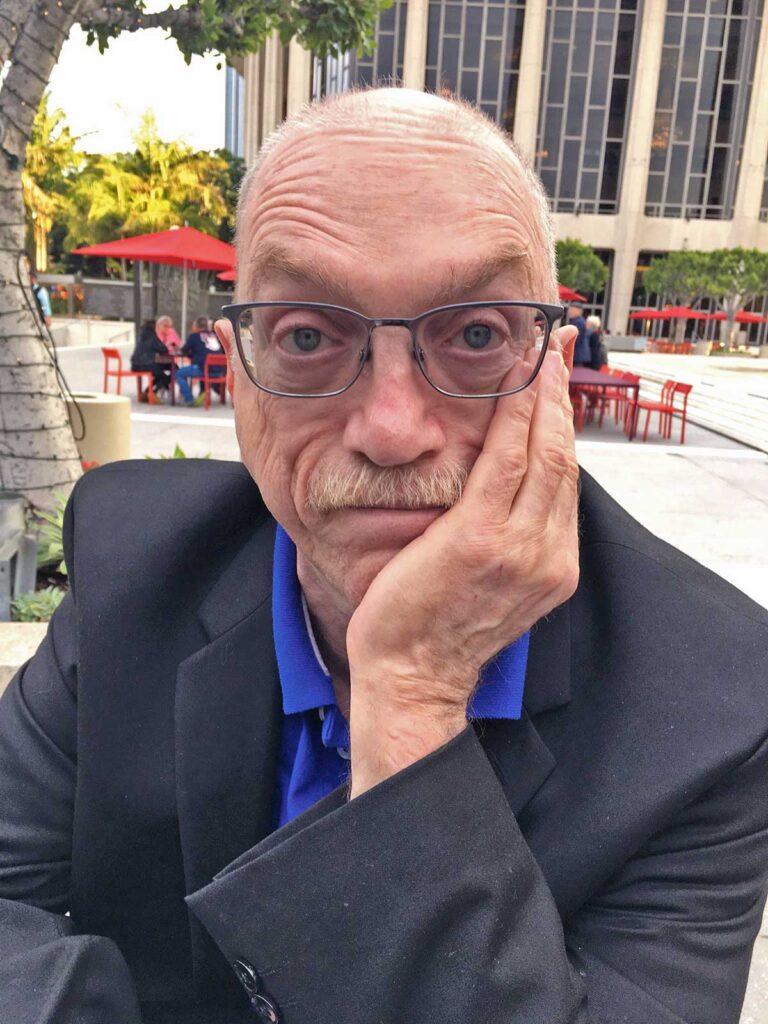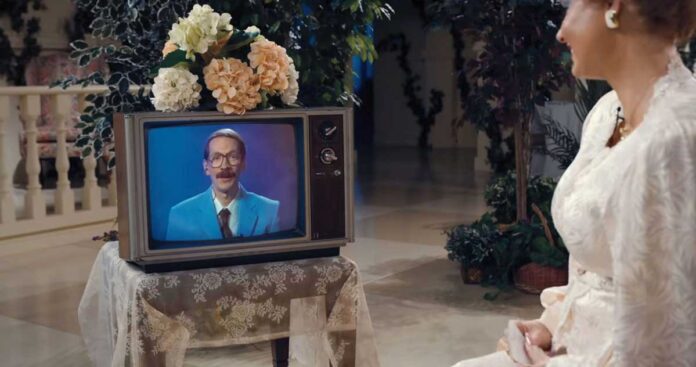At the height of their 1980s popularity, Jim and Tammy Faye Bakker were television evangelist royalty, hosting multiple shows and raking in cash from their on-air collection plates. Tammy Faye, however, also had an expansive view of love and acceptance, despite her conservative Christian roots.
She proved it in 1985 when she had a gay man living with AIDS, Steve Pieters, as a guest on her show, “Tammy’s House Party.” The interview is recreated in the new film “The Eyes of Tammy Faye,” about the rise and fall of the Bakkers. Available now on Blu-ray and digital, it stars Jessica Chastain as Tammy Faye and Andrew Garfield as Jim.
Pieters spoke about the original interview, which is available on YouTube, and the new film.
It’s amazing that of all the events in Tammy Faye’s life, the filmmakers chose to include her interview with you.
I’m thrilled that they did. I’m touched and honored.
It’s ironic that the gay man they found was also a theologian and pastor.
Yes. I was a pastor at the time with [the LGBTQ-affirming] Metropolitan Community Church [MCC], and I had been speaking about living with AIDS for two years or more. I made sure the interview went out live so they couldn’t edit it. It was a kick.
But it was a conservative environment. When did you realize it was friendly ground?
Tammy’s producer had been very friendly. She reassured me that Tammy was proud and excited to be the first to give an affirming interview to a gay man with AIDS.
You also kept bringing the topic back to your faith. When she asked you if you had given women “a chance,” you said God loves you the way you are.
I did that quite deliberately. She had said [before we went on air] that “we don’t talk about Jesus” on this show. And then, of course, we ended up talking about Jesus a lot.

It’s also surprising, frankly, that the person living with AIDS who did that interview in 1985 is still alive to talk about it.
I know! I got sick in 1982 and was diagnosed with GRID [gay-related immunodeficiency, a diagnosis used prior to the discovery of HIV]. They told me I had eight months left to live.
There’s no rhyme or reason to it, is there? Who was empowered, who fought hard, who lived, who died, in those early years.
Yes, absolutely. When I think about all those amazing people who were killed…
What was the initial response from folks to your interview?
Not much. It wasn’t until 1987, when the Reverend Troy Perry played the interview at a general conference for MCC and 1,000 people stood up and cheered, that I got much of a response. I was so shocked. After that, I traveled for 12 years all over the world, and they always wanted me to show that interview at church events. Everyone wanted to see it.
The trailer for “The Eyes of Tammy Faye” gives viewers the impression that she was really going rogue with her interview with you. It didn’t please the conservatives in power. She wasn’t sticking to the political script of homosexuals being a threat to Christianity and democracy.
Absolutely. I don’t know if it was because she had a good heart or because she wanted to be known as someone who did something radical. I don’t know. But I’m told this was not the first time she had talked to a gay man.
The new film explores the mystery of Tammy Faye, meaning whether she was just playing a role or whether she was, in fact, an innocent who loved the Lord. If her constant cheerfulness and loving attitude was a persona, she never, ever dropped it.
I know she treated me like a real human being. She was very compassionate. It seemed very sincere. Her son, Jay Bakker, and I have talked the last couple of years, and he tells me that my interview changed her, and it changed the whole family. After that interview, she decided that she had a calling to minister to the LGBT community. She started taking her kids to MCC services and to Pride parades and to hospices to meet people with AIDS who were sick and dying. Jay said it completely changed their attitudes and her direction in ministry.
Was Jim Bakker involved in any of this?
Jay Bakker tells me that his father was all for having the interview done. They did decide, though, that it should be broadcast on Tammy’s House Party, rather than on their flagship show, The PTL Club [PTL stood for “praise the Lord”]. They thought it would go better if it were on her show.
Now, all of these decades later, the notoriety of doing this interview is all going to come up again. There’s an actor, Randy Havens, playing you in a major Hollywood film. How does that make you feel?
I’m thrilled about it. I got a note from the producer saying that her interview with me figures very prominently in the plot.
Did the producers of the film approach you beforehand to ask your thoughts, then and now, about the interview? Did you even know that the film was happening?
No. I was on Jay Bakker’s podcast, “Loosen The Bible Belt,” and he told me about the movie. He said that the actress Jessica Chastain, who plays Tammy Faye, told him that the interview was central to the plot. Jessica decided to do the film because of that interview in the plot. The producers apparently thought that I was no longer living. Because the interview is on YouTube, I’m considered to be a historic figure, so they don’t have to ask my permission to do it. I wasn’t even aware of it until after the film was in the can.
What are your apprehensions?
There is a little bit of fear in me that this is what’s going to be the lead in my obituary.
This interview and now this film is what I’m going to be remembered for, not that I survived AIDS or was a director of AIDS ministries but that I was that gay pastor with AIDS who did that interview. Which is OK. I could be remembered for a lot worse.
To have represented a community so well on a national television show that became kind of infamous? That’s a great lead for anyone’s obituary. And the interview eventually became your calling card. Look at all the great work you were able to do as a result of that moment. It accelerated your career in advocacy as well as your ministry.
It definitely raised my profile. And I’ve had people over the years come up to me and say that that interview saved their life or that they never realized they could be gay and Christian. I had one person tell me that he was seriously contemplating suicide, and the interview changed his mind.
It’s a fascinating slice of HIV/AIDS history. It deserves to be remembered. And for what it meant for representation of people living with HIV and the marvelous work it helped you do and for the lives it changed, it deserves to be the lead in your obituary — if that turns out to be the case.
That’s true. It was a big deal. And I didn’t even know it at the time.
Mark S. King is an HIV/AIDS advocate and writer for POZ magazine, where this interview originally appeared. This column is a project of TheBody, Plus, Positively Aware, POZ and Q Syndicate, the LGBTQ+ wire service. Visit their websites – http://thebody.com, http://hivplusmag.com, http://positivelyaware.com and http://poz.com – for the latest updates on HIV/AIDS.
